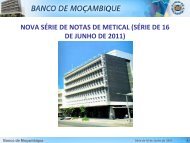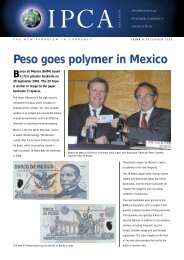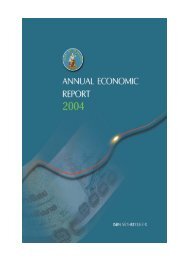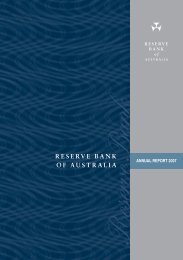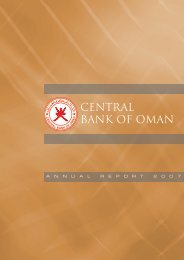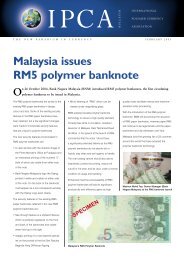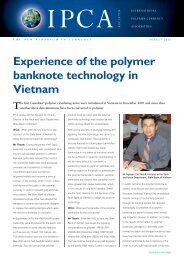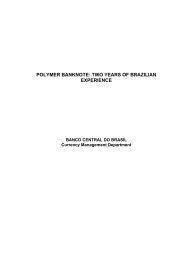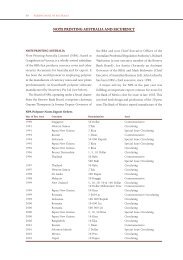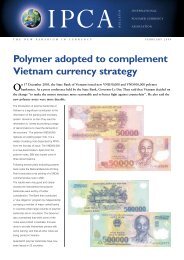ANNUAL REPORT 2008 - Polymer Bank Notes of the World
ANNUAL REPORT 2008 - Polymer Bank Notes of the World
ANNUAL REPORT 2008 - Polymer Bank Notes of the World
Create successful ePaper yourself
Turn your PDF publications into a flip-book with our unique Google optimized e-Paper software.
On a number <strong>of</strong> occasions in <strong>2008</strong>, <strong>the</strong>Eurosystem stressed <strong>the</strong> risks and distortionsrelated to <strong>the</strong> persistence <strong>of</strong> global imbalances. Italso confirmed its full support for a cooperativeapproach to ensure an orderly adjustment <strong>of</strong>global imbalances. In particular, <strong>the</strong> Eurosystemrepeatedly called for policies aimed at increasingprivate and public savings in countries withcurrent account deficits, <strong>the</strong> implementation <strong>of</strong>fur<strong>the</strong>r structural reforms in mature economieswith relatively low potential growth, measuresto increase domestic demand in emergingmarket economies with large current accountsurpluses, improved capital allocation in <strong>the</strong>secountries, and a better appreciation <strong>of</strong> risksmore generally. In <strong>the</strong> context <strong>of</strong> <strong>the</strong> ongoingreflections on how to improve <strong>the</strong> internationalfinancial architecture (see below), in which <strong>the</strong>ECB and o<strong>the</strong>r Eurosystem central banks areparticipating, <strong>the</strong> Eurosystem has underscored<strong>the</strong> importance <strong>of</strong> ensuring that such animprovement also enhances macroeconomicpolicy discipline, in addition to fosteringfinancial market discipline. A streng<strong>the</strong>nedmultilateral economic surveillance frameworkshould help to ensure that economic policies,especially in systemically important countries,are stability-oriented and sustainable.Finally, <strong>the</strong> euro area itself is subject tointernational policy surveillance exercises. In<strong>2008</strong> both <strong>the</strong> IMF and <strong>the</strong> OECD conductedregular reviews <strong>of</strong> <strong>the</strong> monetary, financial andeconomic policies <strong>of</strong> <strong>the</strong> euro area, as acomplement to <strong>the</strong>ir reviews <strong>of</strong> <strong>the</strong> individualeuro area countries. The Article IV consultations<strong>of</strong> <strong>the</strong> IMF and <strong>the</strong> review by <strong>the</strong> OECD’sEconomic and Development Review Committeeprovided an opportunity for useful discussionsbetween <strong>the</strong>se international organisations and<strong>the</strong> ECB, <strong>the</strong> Eurogroup presidency and <strong>the</strong>European Commission. Following <strong>the</strong>sediscussions, both <strong>the</strong> IMF and <strong>the</strong> OECDproduced individual reports assessing <strong>the</strong> euroarea policies. 5INTERNATIONAL FINANCIAL ARCHITECTUREThe financial turmoil led to a wide-rangingdebate on <strong>the</strong> set-up and functioning <strong>of</strong> <strong>the</strong>international monetary and financial system.The EU Heads <strong>of</strong> State or Government agreedat <strong>the</strong>ir informal meeting in Brussels on7 November <strong>2008</strong> to coordinate <strong>the</strong>ir responsesto <strong>the</strong> financial crisis and to implement commonprinciples upon which to build a new internationalfinancial system. On 15 November <strong>the</strong> leaders<strong>of</strong> <strong>the</strong> G20 countries convened in Washington,D.C. for <strong>the</strong>ir first ever summit on financialmarkets and <strong>the</strong> world economy. They calledfor action in <strong>the</strong> areas <strong>of</strong> financial regulation andmacroeconomic policies and underlined <strong>the</strong>ircommitment to free trade. The follow-up workto this summit has been organised through fourworking groups reporting to <strong>the</strong> G20 finance andcentral bank deputies, who prepared <strong>the</strong> meeting<strong>of</strong> <strong>the</strong> G20 finance ministers and central bankgovernors in spring 2009.In response to calls from <strong>the</strong> IMF’s members,concrete changes were made to <strong>the</strong> Fund’sfacilities for financial support. In October anew financing instrument was created, <strong>the</strong>short-term liquidity facility. The purpose <strong>of</strong>this instrument is to provide quick-disbursingfinancing for countries with strong policies anda good track record that are facing temporaryliquidity problems arising from developments inexternal capital markets. As well as establishingthis new instrument, <strong>the</strong> Fund embarked on areview <strong>of</strong> <strong>the</strong> various aspects <strong>of</strong> its lending role.Fur<strong>the</strong>rmore, it provided financing to some <strong>of</strong> itsmember countries, including Belarus, Hungary,Iceland, Latvia, Pakistan and Ukraine, throughits regular standby arrangements.Various efforts to reform <strong>the</strong> IMF continuedin <strong>2008</strong>. Key areas for reform which werediscussed included IMF surveillance, <strong>the</strong>Fund’s lending role, <strong>the</strong> governance <strong>of</strong> <strong>the</strong> Fund(including quotas and voice), and its income andexpenditure framework. Agreement on <strong>the</strong>seissues has been pursued through discussionsboth inside <strong>the</strong> IMF and in o<strong>the</strong>r fora, suchas <strong>the</strong> G7 and G20, with <strong>the</strong> ESCB and <strong>the</strong>Eurosystem playing <strong>the</strong>ir part by monitoring and5 “Euro area policies: <strong>2008</strong> Article IV consultation – staff report”,IMF, August <strong>2008</strong> and “Economic survey <strong>of</strong> <strong>the</strong> euro area”,OECD, January 2009.178 ECBAnnual Report<strong>2008</strong>


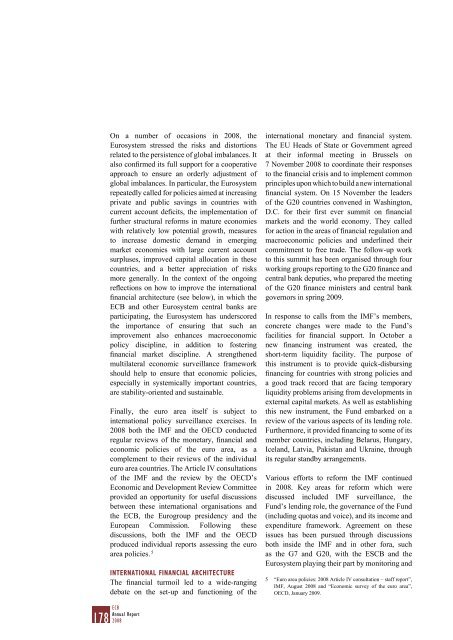
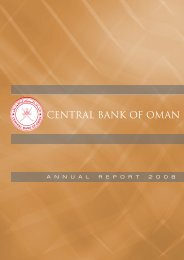
![KNOW YOUR NEW GIBRALTAR BANKNOTES - [Home] bThe/b](https://img.yumpu.com/50890985/1/184x260/know-your-new-gibraltar-banknotes-home-bthe-b.jpg?quality=85)
![PAPUA NEW GUINEA - [Home] - Polymer Bank Notes of the World](https://img.yumpu.com/49758743/1/190x143/papua-new-guinea-home-polymer-bank-notes-of-the-world.jpg?quality=85)

